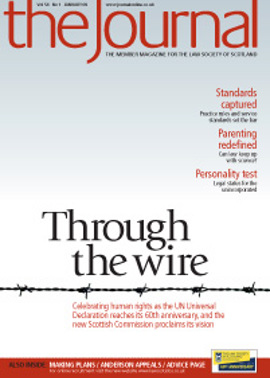Living wills - why?

Recent widely-reported voluntary euthanasia cases have sparked further debate and interest in the topic of “living wills”. That term is in fact a misnomer as the documents have no testamentary effect: they do not deal with the granter’s property, and are intended to receive effect during the granter’s life. A living will, properly termed an advance medical directive (AMD), details the circumstances in which an individual does not wish to receive treatment, if having become unable to communicate their wishes. It requires inaction on the part of the clinician: quite the opposite from voluntary euthanasia, often described as physician-assisted suicide.
It perhaps took a tragedy to focus attention on living wills. In the Tony Bland case, although the House of Lords shied away from supporting the legality and enforceability of a living will, the Lords expressed views generally supportive of such directives, and went as far as to suggest that a clinician who ignored a valid AMD might be guilty of assault. Perhaps in consequence, AMDs existed in a legal limbo for many years. Even clinicians supportive of using AMDs were concerned about the legal consequences which might arise from either ignoring or giving effect to them.
The position in England & Wales moved on as a result of their judges’ willingness to grasp the nettle. In the 1994 case C (Adult – Refusal of Medical Treatment), Mr Justice Thorpe held that an advance written declaration refusing treatment, granted when the patient was capax, would survive any supervening incapacity, even where the refusal might lead to the patient’s death.
This decision highlighted the true importance of a living will. It has a very specific purpose: it covers the granter when he or she may have become incapax or no longer able to communicate. A patient who is terminally ill but is capax and can communicate has always been entitled to refuse treatment. This has been recognised in a series of cases in England. Such a refusal would be likely to be upheld in court, even if it might be seen by clinicians as eccentric. This possibility is recognised in one of the guiding principles under the Mental Capacity Act 2005 (E&W), which came into force in October 2007: individuals must retain the right to make what might be seen as eccentric or unwise decisions.
In further decisions in England & Wales, the court has upheld the validity of an AMD to the effect that the patient should not be resuscitated if found unconscious after attempting suicide (W (Adult – Refusal of Medical Treatment) (2002)); and an AMD actually requiring that certain treatment be given once the patient had lost capacity (R (on the Application of Burke) v GMC (2004)).
It is well recognised that legislative intervention in a democratic society tends to lag behind developments within that society. The English judgments were eventually reflected in ss 24-26 of the 2005 Act, which acknowledges, subject to certain tests and safeguards, the validity of an advance decision (the term it applies to a living will).
Scotland now lags in statutory recognition of a properly framed AMD. That alone may be a spur to the Scottish Government to examine this question, but it is not the crux of my argument.
Why should living wills be recognised by statute in Scotland? First, in line with English authorities, it seems to me illogical that, when an individual has capacity and is able to communicate, their decision not to receive treatment will be respected, and yet, when the same individual indicates firmly and in advance that they do not wish specific treatment, this may be called into question because at the relevant, later time, they are unable to communicate.
Article 8 of the European Convention on Human Rights states that “everyone has the right to respect for his private and family life, his home and his correspondence”. It could be argued that observance of a properly made AMD is no more than recognition of and compliance with that human right.
A well structured statutory code would also provide appropriate guidance and protection for our clinicians (particularly those who, notwithstanding the guidance issued by the BMA and Royal College of Nursing) have moral, religious or philosophical objections to AMDs.
A Dutch study concluded that in relation to 90% of assisted deaths, life was shortened by one month or less, and in 42% by less than a week. Although the report related to voluntary euthanasia (another topic which should be openly debated here), it is relevant to the issue of whether an AMD should be given effect. Why should an individual, having expressed his firm wishes when capax, be required to endure continued suffering, against those very wishes and even with appropriate palliative care, to secure only a short additional period of life with no quality? Appropriate policies and strategies for better palliative care are of great importance for those who wish it, but not for those to whom it may be administered against their expressed and clear wishes.
In this issue
- Public law in Scotland
- Harmony in conflict management
- Tapping Reeve and his legacy
- Busy times at 60
- Living wills - why?
- Forward by the rights
- A cornerstone of rights
- Welcome for rejections takeup
- Sins of omission
- A time to buy?
- Parenthood reborn
- Persons unknown
- Front of the class
- Setting the standards
- Client service: the standards
- Judicial appointments: how you can take part
- ABS - the next phase
- Third parties and premature complaints
- Planning to perform
- Manual for the mind
- Computing on tap - or money down the drain?
- When resolution is not enough
- Ask Ash
- Making up lost time?
- Don't get caught short by transfer traps
- Collaboration: a new dimension
- Packed and ready
- Regulator on a roll
- Scottish Solicitors' Discipline Tribunal
- Website review
- Book reviews
- Medicines: the wrong cure
- Fraud alert! (and a cautionary tale)






